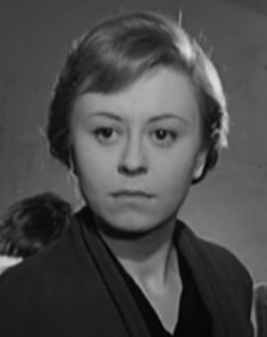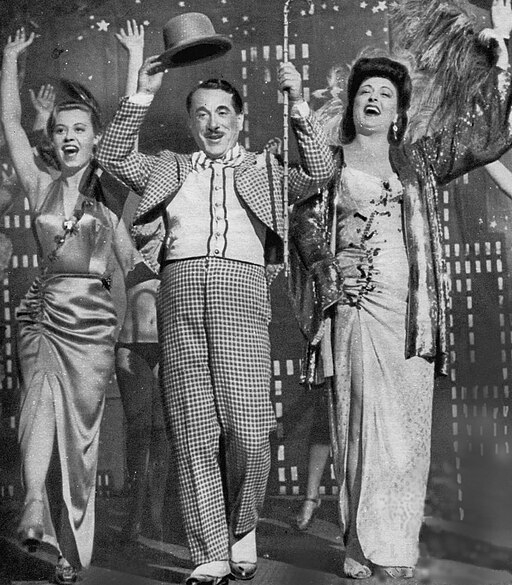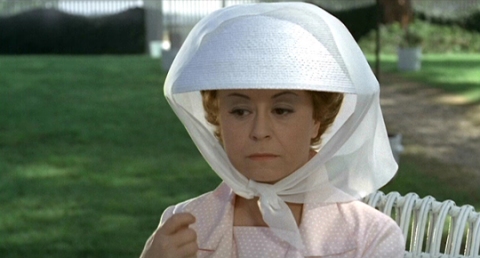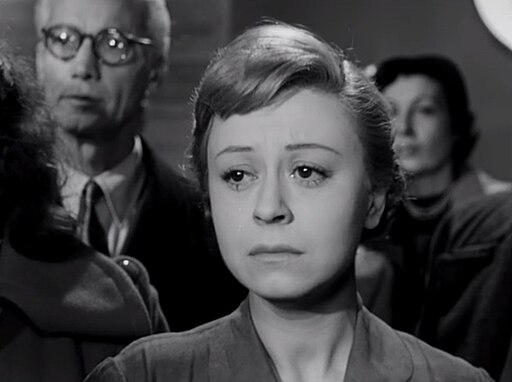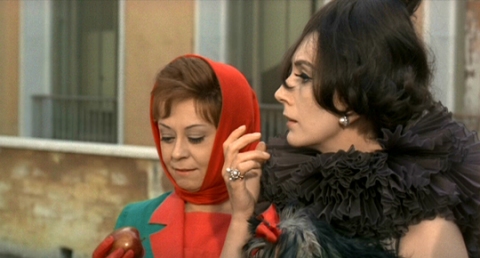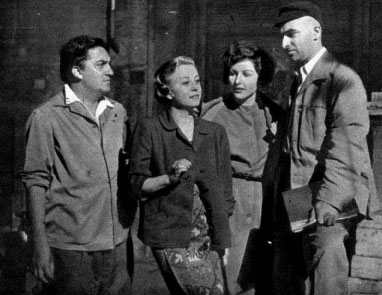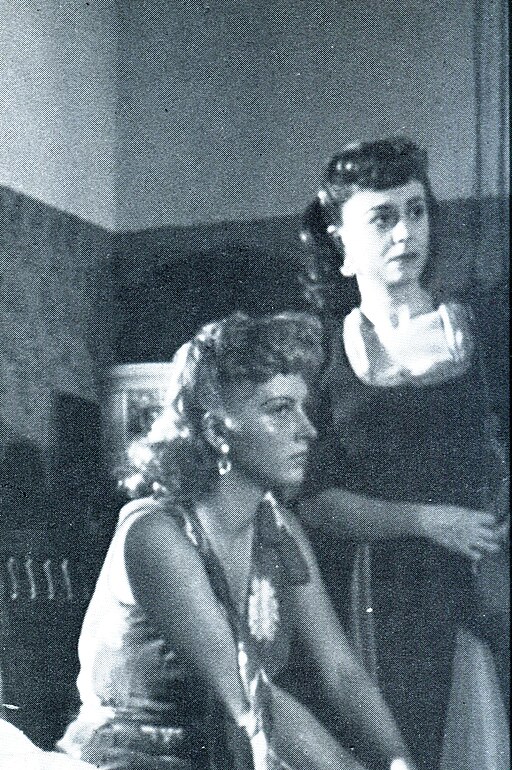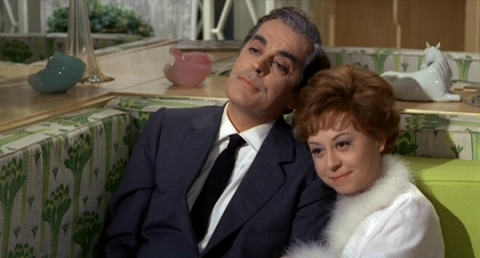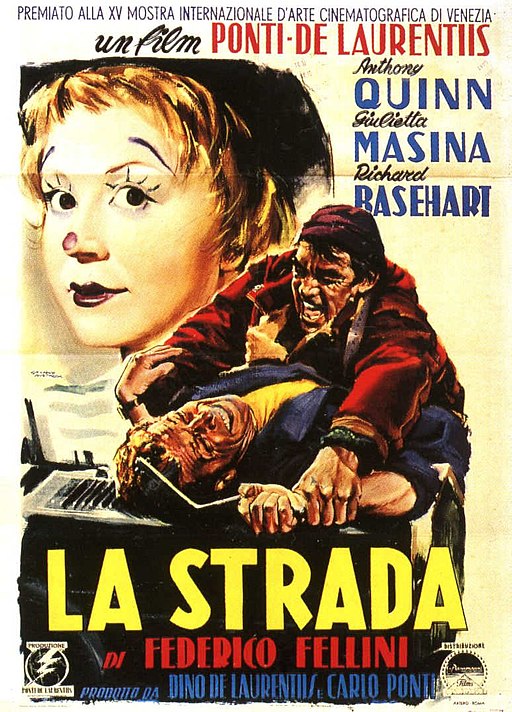Giulietta Masina
back| Full Name | Giulia Anna Masina |
| Stage Name | Giulietta Masina |
| Born | February 22, 1921 |
| Birthplace | San Giorgio di Piano, Bologna, Italy |
| Died | March 23, 1994 |
| Buried | Cemetery of San Michele in Isola, Venice, Italy |
| Married to | Federico Fellini (married 1943 until her death in 1994) |
| Children | Pierfederico, who was born prematurely in March 1945 and died a few weeks later |
| Notable films | La Strada (1954) - Nights of Cabiria (1957) - Juliet of the Spirits (1965) - Variety Lights (1950) - The Swindle (1955) |
Giulietta Masina
La piccola Fellini
Giulietta Masina (1921-1994) was celebrated for her deeply emotive and expressive performances in neorealist cinema. Masina's career took off with her roles in films directed by her husband, Federico Fellini.
Her most notable performances include Gelsomina in "La Strada" (1954) and Cabiria in "Nights of Cabiria" (1957), both earning her international acclaim and awards, including Best Actress at Cannes and the Silver Bear in Berlin.
Related
Giulietta Masina (1921 – 1994)
Biography and Overview of her Acting Career
Giulietta Masina was born in a small town near Bologna, Italy. She was the eldest of four children in a middle-class family. Her father was a violinist and her mother a schoolteacher. From an early age, Masina showed an affinity for performance, often putting on plays and recitals for her family.
Masina attended the University of Rome, where she studied Literature. It was during her university years that she became involved in theatre groups, honing her acting skills. She also worked as a radio actress, where her distinctive voice and emotional depth gained attention.
Masina's film debut came with a small role in "Paisà" (1946), directed by Roberto Rossellini. However, her breakout role was in Federico Fellini's "La Strada" (1954), where she played the innocent and tragic Gelsomina. Her performance won her international acclaim, including the Best Actress award at the Cannes Film Festival.
Marriage and Personal Life
Masina met Federico Fellini in 1942, and they married in 1943. Their marriage was a creative partnership as well. The couple worked together on several critically acclaimed films, with Fellini directing and Masina often playing leading roles. Despite personal tragedies, including the loss of their son, their marriage was a lasting bond of love and mutual respect.
Career Highlights
Following "La Strada," Masina starred in "Nights of Cabiria" (1957), earning widespread acclaim for her portrayal of a streetwise yet vulnerable prostitute. The film won the Academy Award for Best Foreign Language Film. Her other notable films include "Juliet of the Spirits" (1965), "Variety Lights" (1950), and "The Swindle" (1955).
Giulietta Masina was often affectionately referred to as "La piccola Fellini" which translates to "Little Fellini." This nickname reflected not just her physical stature but also her close personal and professional relationship with her husband, Federico Fellini. However, this moniker does more than just tie her to the famous director; it underscores her significant role in the collaborative process that led to some of the most iconic films in Italian cinema.
Passions and Interests
Apart from acting, Masina was passionate about literature and music. She often described how these art forms influenced her acting style. She was known for her philanthropy, particularly her work with children and the less fortunate.
Later Years and Death
- Died: March 23, 1994
- Cause of Death: Lung cancer
- Buried: Cremated; ashes placed in a columbarium at the Cemetery of San Michele in Isola, Venice, alongside those of her husband.
In her later years, Masina made fewer public appearances. She battled with lung cancer and passed away in Rome, just five months after the death of her beloved husband, Federico Fellini. Her death marked the end of an era in Italian cinema, leaving behind a legacy of profound performances that continue to inspire actors and filmmakers around the world.
Trailer of Nights of Cabiria:
Marriage with Federico Fellini:
Giulietta Masina's marriage with Federico Fellini was not just a romantic partnership but also a profound artistic collaboration, significantly influencing the landscape of Italian cinema.
Meeting and Marriage
- Meeting: Masina and Fellini met in 1942. At that time, Fellini was working as a scriptwriter in Rome, and Masina was a young actress. Their initial meeting reportedly happened through a mutual friend, the actor Aldo Fabrizi.
- Marriage: They married in 1943, just a year after they met. Their marriage was characterized by a deep emotional and creative bond.
Professional Collaboration
- Creative Synergy: Their collaboration was one of the most iconic in cinema history. Fellini directed Masina in several films, including "La Strada," "Nights of Cabiria," "Juliet of the Spirits," and "Ginger and Fred." In these films, Masina's emotive acting perfectly complemented Fellini's visionary direction.
- Influence on Each Other's Work: Fellini often wrote roles specifically for Masina, drawing on her unique ability to portray characters that were at once vulnerable, resilient, and deeply human. Masina, in turn, brought these characters to life with her naturalistic and poignant performances, often contributing to the development of her characters.
Personal Life
- Bond: Despite the public nature of their careers, they maintained a relatively private personal life. Their relationship was often described as one of mutual respect and deep understanding.
- Tragedy: The couple faced personal tragedies, most notably the death of their only child, a son named Pierfederico, who died shortly after birth in 1945. This loss had a profound impact on both of them.
Challenges
- Rumors and Speculations: Their marriage, like any, had its challenges. There were rumors and speculations about infidelities, especially surrounding Fellini. However, the couple remained together until the end of their lives.
- Support System: Masina was known to be a significant source of support and inspiration for Fellini, both emotionally and artistically.
Later Years and Deaths
- Enduring Relationship: Their marriage lasted until Fellini’s death in 1993. Masina passed away five months later in 1994. The closeness of their deaths is often seen as a testament to their deep connection.
- Legacy: Their marriage left a lasting legacy not just in terms of their personal love story, but also in the cinematic masterpieces they created together. Their collaboration remains a celebrated chapter in film history, showcasing the synergy that can exist between director and actor.
Notable Movies starring Giulietta Masina:
-
"La Strada" (1954):
This film brought her international fame and the Best Foreign Language Film Oscar for Italy. Masina's portrayal of Gelsomina, a naïve and innocent girl sold to a brutish strongman, won her the Best Actress award at the Cannes Film Festival. -
"Nights of Cabiria" (1957):
Masina played the role of Maria 'Cabiria' Ceccarelli, a spirited but vulnerable prostitute. The film won the Academy Award for Best Foreign Language Film, and Masina's performance was widely acclaimed. -
"Juliet of the Spirits" (1965):
A fantasy drama film where Masina played the lead role of Giulietta, a woman who, after suspecting her husband of infidelity, enters into an ethereal world of her own fantasies and fears. -
"Variety Lights" (1950):
Directed by Federico Fellini and Alberto Lattuada, this film marked Masina's first major film role. -
"The Swindle" (1955):
A comedy-drama where she played a significant role.
Analysis of Giulietta Masina’s Acting Style:
Giulietta Masina's acting style was unique, deeply emotive, and often hailed as a perfect blend of dramatic and comedic elements. Her performances are remembered for their expressive depth, characterized by the following attributes:
Expressive Physicality and Facial Expressions
Masina's physicality was a cornerstone of her acting. She had an extraordinary ability to convey complex emotions through her body language and facial expressions. Her eyes, often described as soulful and emotive, were particularly expressive. They could reflect a myriad of feelings, from deep sorrow to childlike wonder, often within the same scene. This physical expressiveness made her a natural fit for the Italian Neorealism movement, which emphasized authentic emotion and realism.
Innocence and Vulnerability
Masina often portrayed characters with a sense of innocence and vulnerability. In "La Strada," for example, her portrayal of Gelsomina is a testament to this style. She imbued the character with a childlike naivety and an innate goodness that resonated deeply with audiences. This vulnerability became a hallmark of her characters, making them relatable and profoundly human.
Tragicomic Balance
Masina had a unique ability to blend tragedy and comedy, often within the same character. Her roles frequently navigated this delicate balance, allowing her to showcase a range of emotions. In "Nights of Cabiria," she portrayed a character who, despite life's hardships and betrayals, maintained a sense of humor and resilience. This tragicomic approach not only defined her acting style but also reflected the complexities of human experience.
Collaborative Synergy with Federico Fellini
Her collaboration with her husband, director Federico Fellini, was a significant aspect of her career. Fellini's visionary direction and Masina's emotive acting complemented each other perfectly. Fellini often created characters and scenarios that perfectly matched Masina’s strengths as an actress, allowing her to explore different facets of her talent.
Intense Emotional Depth
Masina's performances were often marked by an intense emotional depth. She could convey profound sadness, joy, or despair with subtle nuances, making her characters multi-dimensional and deeply compelling. Her ability to delve into the emotional psyche of her characters made her performances memorable and often heart-wrenching.
Legacy and Influence
Masina's acting style has had a lasting impact on cinema. Her ability to bring raw emotion to the screen, coupled with a unique blend of vulnerability and strength, has influenced generations of actors. She remains a symbol of emotional authenticity in acting, with her performances continuing to be studied and admired for their depth and humanity.
Memorable Quotes from Giulietta Masina:
From "La Strada" (as Gelsomina)
- Gelsomina: "Why do you always act so mean to me? You know I'm not so bad."
In "La Strada," Gelsomina's innocence and simplicity are heartbreakingly captured in her dialogue, reflecting her inner purity and the harshness of the world she encounters.
From "Nights of Cabiria" (as Cabiria)
- Cabiria: "I'm not a woman, I'm a gondola!"
This line reflects Cabiria's blend of humor and tragedy, a characteristic feature of Masina's roles.
Awards and Recognition:
Awards
Cannes Film Festival
- Best Actress Award for "La Strada" (1954)
Academy Awards
- While Masina herself was not awarded an Oscar, two films she starred in, "La Strada" (1954) and "Nights of Cabiria" (1957), won the Academy Award for Best Foreign Language Film.
David di Donatello Awards (Italian national film awards)
- Best Actress for "Nights of Cabiria" (1957)
- Best Actress for "Juliet of the Spirits" (1965)
- Career David in 1986, a lifetime achievement award
Nastro d'Argento Awards (Italian film journalists' awards)
- Best Actress for "La Strada" (1954)
- Best Actress for "Nights of Cabiria" (1957)
San Francisco International Film Festival
- Best Actress for "Nights of Cabiria" (1957)
Venice Film Festival
- Pasinetti Award for "Nights of Cabiria" (1957)
Berlin International Film Festival
- Silver Bear for Best Actress for "Nights of Cabiria" (1958)
Karlovy Vary International Film Festival
- Best Actress for "Nights of Cabiria" (1957)
Other Honors
- Masina received various other accolades and honorary awards throughout her career, including recognition for her lifetime contributions to cinema.
Full List of Movies featuring Giulietta Masina:
- 1948: "Senza pietà" (Without Pity)
- 1948: "Paisà" (Paisan)
- 1950: "Luci del varietà" (Variety Lights)
- 1951: "Campane a martello" (Bellissima)
- 1952: "Europa '51" (The Greatest Love)
- 1954: "La Strada"
- 1955: "Il Bidone" (The Swindle)
- 1957: "Le Notti di Cabiria" (Nights of Cabiria)
- 1960: "Nella città l'inferno" (Hell in the City)
- 1965: "Giulietta degli spiriti" (Juliet of the Spirits)
- 1969: "Nell'anno del Signore" (In the Year of the Lord)
- 1973: "Roma" (uncredited)
- 1973: "I clowns" (The Clowns)
- 1977: "La città delle donne" (City of Women) (uncredited)
- 1985: "Ginger e Fred" (Ginger and Fred)
- 1991: "Aujourd'hui peut-être..." (Maybe Today)

